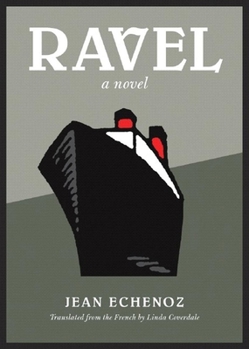Ravel
Select Format
Select Condition 
Book Overview
"A tiny miracle of a biographical novel" inspired by the life of the brilliant French composer (Booklist). Shortlisted for the International IMPAC Dublin Literary Award This beguiling and original... This description may be from another edition of this product.
Format:Hardcover
Language:English
ISBN:1595581154
ISBN13:9781595581150
Release Date:June 2007
Publisher:New Press
Length:192 Pages
Weight:0.59 lbs.
Dimensions:0.6" x 5.5" x 7.6"
Customer Reviews
3 ratings
A small gem
Published by Thriftbooks.com User , 15 years ago
This novel by the award winning French author was shortlisted for this year's IMPAC Dublin Literary Award. It consists of nine snapshots of the composer Maurice Ravel during the last 10 years of his life. In the first chapter we find Ravel reclining in his bathtub on the day he is set to embark on a four month tour of the United States, in 1927. He is contemplative and quite reluctant to leave his aqueous cocoon: 'Leaving the bathtub is sometimes quite annoying. First of all, it's a shame to abandon the soapy lukewarm water, where stray hairs wind around bubbles among the scrubbed-off skin cells, for the chill atmosphere of a poorly heated house. Then, if one is the least bit short, and the side of that claw-footed tub the least bit high, it's always a challenge to swing a leg over the edge to feel around, with a hesitant toe, for the slippery tile floor. Caution is advised, to avoid bumping one's crotch or risking a nasty fall. The solution to this predicament would be of course to order a custom-made bathtub, but that entails expenses, perhaps even exceeding the cost of the recently installed but still inadequate cnetral heating. Better to remain submerged up to the neck for hours, if not forever, using one's right foot to periodically manipulate the hot-water faucet, thus adjusting the thermostat to maintain a comfortable amniotic ambience.' Subsequent chapters describe the creation of Boléro and Piano Concerto for the Left Hand for Paul Wittgenstein, who lost his right arm during World War I and earned the wrath of Ravel by embellishing the concerto, and Ravel's rapid decline before his premature death. Despite the book's small size, Echenoz provides fascinating and exquisite detail into the life and mind of Ravel, with rich descriptions of the luxury liner that carries him to America and the cross-country trains that take him from one city to the next on his tour, and the despair he experiences toward the end of his life. This is a book that begs to be reread, and I would imagine that the reader would glean greater insight and enjoyment on repeated readings, similar to repeated listening to a fine piece of music.
Exact, elegant and descriptive writing
Published by Thriftbooks.com User , 15 years ago
Jean Echenoz exhibits a great mastery of descriptive detail in this intelligent and entertaining novella. However, a great deal of credit belongs to Linda Coverdale for her excellent work in translating this work from the French language. The descriptive talents of the author allow the reader to feel as though he has an actual glimpse of the world through Ravel's own exacting perception. Whereas some authors might use detailed description in this way as a gimmick, M. Echenoz is indeed a master that never seems to go too far in his use of the technique. There is always a bit of analytical distance that comes about the detailed focus of the person of Ravel, but the author also presents the musical man as a unique and fastidious individual who requires order, convention, and respect of the world around him. Ultimately, while the tale ends somewhat somberly with the intellectual and mental struggles of the composer, the brief and intimate walk with Maurice Ravel as a visionary man of his times makes this novella a small masterpiece.
Minimalist fiction?
Published by Thriftbooks.com User , 17 years ago
Jean Echenoz's Ravel is simple, precisely pruned for minimum gestures that achieve maximum effects, and unfailingly elegant. The narrative traverses Maurice Ravel's tour of the United States in 1927 and his continuing decline (signs of which appear before he embarks and occur now and then during the trip)toward his untimely death. The author makes no attempt to explore or explain the "mysteries" of musical creation or the nature of "genius." This is not a large novel about the psychology of the artist, nor is it really a small novel about the same. It delicately constructs a portrait of a man who has lived very nearly with no human relationships of any depth, who has depended upon the generosity and patience of friends and admirers, almost parasitically, and yet who somehow manages to remain sympathetic or at least interesting enough to be worth reading about. What is most impressive about this novella (it is called a "novel" on the cover, but the text of the narrative fills fewer than 100 pages of generously spaced large type, so I think of it as a novella) is the control exercised by the author--every detail feels properly placed after careful weighing to assure its appropriateness; nothing is excessive, nothing is out of place. The literary mastery is undeniable. Even more--the success is that though the work is so carefully and artfully composed, it never feels precious or excessively studied. And finally, it has sent me back to Ravel's music, especially the lovely chamber works. And I know that I will read the novella again (one of the virtues of a short narrative--it is easier to contemplate re-reading it than is possible with some of the great loose and baggy monsters one also loves. So why 4 stars? It is lovely--an elegantly carved cameo--but minor.






